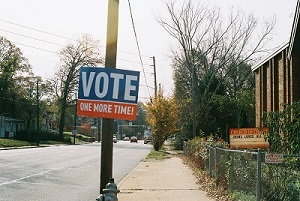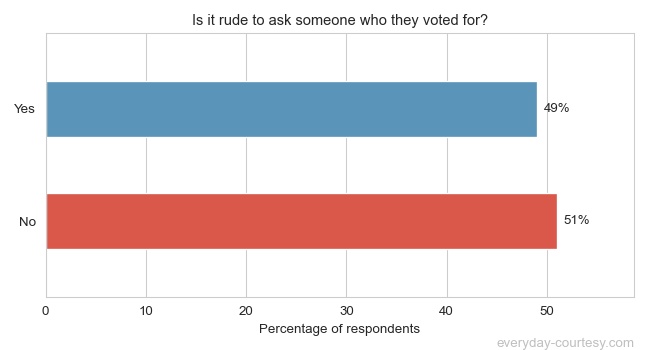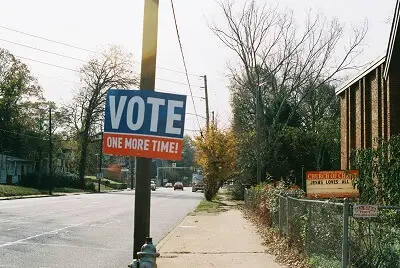Elections are often an emotional issue because people have their own preferences for who they vote for. Since elections are usually held secretly, asking who someone voted for can be rude.

We started a survey to find out whether asking who someone voted for puts a foot in your mouth or not. Unfortunately, the respondents split in two in this respect, and you must always expect that this question will be considered impolite.
Is It Rude To Ask Someone Who They Voted For?
In our recent survey, data collected from 102 people showed that 51% of the respondents believed it wasn’t rude to ask someone who they voted for. The remaining 49% affirmed that it was rude to ask someone who they voted for.

The two responses show that the question of revealing who one voted for is a divided one and there are reasons for each response. The people who participated in the survey were majorly young people. Given that young people represent a significant percentage of voters, they were a viable population for the survey.
Let’s understand the results of the survey further by looking deeply at the two responses.
Why It May Be Rude To Ask Someone Who They Voted For
Voting is a private matter
Voting has always been a private matter. Why should you be concerned about who a person voted for? There is a reason why voting has always been a secret ballot affair.
There are reasons why people keep their votes secret. So, if you happen to pressure people who don’t want to reveal who they voted for, you’ll be acting rudely.
If you think about it critically, entering into a person’s private space isn’t a courteous thing. If you notice that someone doesn’t want to disclose who they voted for, it’s better not to ask them about it.
The best advice here is to examine the emotions and attitude of a person before asking them who they voted for. In this way, you’ll avoid getting too personal and acting rudely.
Is there any point in knowing who a person voted for?
The reason why a section of the people think it’s rude to ask them who they voted for is that they don’t see the point in sharing.
A good example in a conversation would be:
“Who did you vote for in the election?”
Then the response can be something like: “Why should I tell you? What difference does it make?”
Clearly, from the response, it’s obvious that the person to whom the question is directed doesn’t feel okay with it.
Voting is not always an informal thing
Contrary to what many people think, voting is not as casual as you may think. According to a 2013 article by PLOS ONE, politics is a subject that elicits a lot of emotions among people. [1]
In situations where elections are hotly contested, the degree of emotions can go so high that people become divided. In such a situation, it may appear rude to ask someone who they voted for.
The best thing is to avoid asking the question when elections and voting results are likely to cause high emotions.
Why It’s Not Rude To Ask Someone Who They Voted For
There are those who believe that it’s not rude to ask someone who they voted for in an election. Here are the arguments for this assertion:
Being proud of who you voted for
Whenever a person goes to vote in an election, they have a person in mind and they vote with pride. For this reason, such a person should not see it as a rude thing if they are asked who they voted for.
In this argument, if you voted for someone it means you’re proud of him and you don’t mind sharing him with others.
So, if you’re proud of the person you voted for, you won’t get offended if asked who you voted for.
Someone can ask the question in a courteous way
If you ask a question in a courteous way, the person responding won’t view it as rude. So, even if you’re asking a question about who a person voted for, it can come out well depending on how you ask the question.
Yes, politics can be an emotive issue, but if the engagements and questions are put out in a polite way, they won’t come out as rude.
For example, you can ask in a polite way like:
“Do you mind telling me who you voted for?”
The framing of the question is polite enough to get a positive response from someone.
It helps to discuss politics
Those in favor of asking who persons voted for argue that it helps to discuss politics. If people are able to ask questions to their friends and colleagues regarding who they voted for, it opens the door to discuss politics. That’s why they don’t see it as a rude thing to ask someone who they voted for.
The moment people share information regarding who they voted for, they create a good environment to talk about issues related to politics. It can end up being a good conversation depending on how they interact with one another.
In this situation, it’s important to consider the person you’re asking the question to because not all people can engage in a discussion.
Certainly, whether it’s rude or not to ask someone who they voted for, it all comes down to the presentation of the question and the situation on the ground.
For example, if you ask in a courteous way, it’s highly likely that it won’t come out as rude. Also, if the person you’re asking the question is emotive about the issue, it’s best not to ask because it’s likely to appear rude.
So, the bottom line is that one should examine a person and the general situation before asking who one voted for.
You are trying to find common ground
Elections can be a great way to find something in common with a person you’ve just met or even someone you’ve known for a long time but haven’t had the opportunity to connect with. This can be particularly useful if you’re trying to make small talk or want to get a conversation started on something that isn’t too controversial.
You are trying to make conversation
If you find that you have nothing in common with someone, politics might be a good place to start if you want to make conversation with them. The best way to do this is to ask them about the election at first so as not to come off as too forward and personal by asking them who they voted for first.
But if that doesn’t work, then asking them directly who they voted for might be your best bet if there is nothing else you have in common with this person.
You’re trying to get to know them better
It’s been said that politics doesn’t define who you are as a person, but rather it shapes your perspective on certain issues. While voting for someone may not determine what kind of person you are, it does help give insight into how an individual thinks.
And if you’re looking at pursuing a relationship with someone, then knowing their political views can be beneficial in understanding their overall personality and worldview.
You are trying to find out if you should pursue a relationship with them
In the early stages of a new relationship, it’s okay to ask someone they voted for – because you’re trying to figure out their fundamental outlook on life. Do their political views mesh with yours?
Do they have the same values as you? Even if that candidate didn’t win, it could help you decide whether this person is compatible with your worldview. If they don’t like your political preference, you are allowed to find someone who does. [2]
Be Polite When Asking Someone About Their Vote
If you are in a private setting, your best option is to ask your coworker or neighbor if they voted yesterday and how their day went at the polls. Suppose it’s someone who is obviously interested in politics and enjoys talking about it. In that case, you can probably proceed with your question about whether they chose Candidate A or Candidate B.
But if they aren’t so much into politics and don’t naturally bring up who they voted for or who they think will win when talking about the election, then it’s best not to pry any further.
If you are in a public setting, like on the subway or at a bar, remember: there are many people around you who most likely do not share the same political views as you do – even if someone appears similar to you on the surface.
While it might be tempting to approach this person to talk about elections if they strike up a conversation with you first, be sure not to make sweeping judgments based on outward appearance alone. Don’t say anything that could offend someone.
Five Tips for Politely Asking Someone Who They Voted For
1. Taste the waters first
Always ask if they are comfortable talking about it before diving full force into political talk.
2. Keep it cultured
Use a calm, friendly, and accepting tone of voice (not judgmental or aggressive).
3. Ask privately
Please don’t put them on the spot by asking while they’re working or in the middle of something else. Give them time to think about what they want to say, rather than blurting out an answer because they feel pressured by your question.
4. Respect their choice
Don’t try to argue with them about their choice or change their mind for them (unless you’re in a safe space specifically designed for debate and discussion). If you need to vent about something that happened, ask a trusted friend instead!
5. Get offline!
This may be a good time to suggest taking the conversation from comments into private messages instead-especially if people are starting to get heated on either side (or both). [3] If done properly, this can be a great way for friends and family members who might disagree opinion-wise to come together over shared experiences and maybe even find some common ground with each other along the way!
In a Nutshell
No, it is not rude to ask someone who they voted for. Political views are a part of our culture. Nonetheless, a person’s political affiliation is their choice and not something anyone can legally force them to disclose.
References:
[1]: https://journals.plos.org/plosone/article?id=10.1371/journal.pone.0083143
[2]: https://www.ncbi.nlm.nih.gov/pmc/articles/PMC8266382/
[3]: https://journals.sagepub.com/doi/full/10.1177/1461444818795487

Matt Vargas is an author and public speaking coach with a degree in sociology and more than ten years of practical experience. Matt is responsible for the empirical surveys at everyday-courtesy.com, is a passionate recreational musician, and blogs here about his experiences in the field of interpersonal communication.

